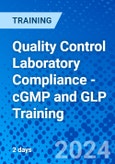This course offers comprehensive training on the essential requirements for all QC laboratories subject to FDA inspection. Participants will learn about recent trends in FDA inspection reports and enforcement actions, as well as relevant regulations and guidelines. Quality control and quality assurance personnel will also learn how to monitor industry practices to stay up-to-date with FDA requirements, including cGMPs and GLPs. Enroll in this course to ensure your QC laboratory is compliant and avoid costly consequences.
SEMINAR OBJECTIVES
- The basics of FDA law and regulations governing QC laboratories responsible for testing research materials, components of FDA-regulated products, and finished FDA-regulated products (pharmaceuticals, biologics, medical devices, cosmetics, and foods).
- Laboratory organization, personnel qualification and training requirements.
- Documentation and record-keeping requirements, including e-records and data integrity.
- Sample integrity requirements.
- Management and control of stability (shelf-life) studies.
- Analytical methods verification and validation.
- Management and control of laboratory instruments.
- Management and control of laboratory supplies.
- Proper conduct of laboratory investigations.
- Consequences of laboratory non-compliance.
Course Content
Speakers
Kelly ThomasMs. Thomas has over two decades of cGMP hands-on industry experience in both pharmaceutical and medical device manufacturing operations. Her experience covers all Quality Systems; as well as, all areas of validation; including, process/product validation, facilities validation, CSV and 21 CFR Part 11, test method validation, equipment/automated processes and cleaning validation.
Utilizing strategic thinking, risk based approaches, and Lean principles, she has demonstrated success in steering and managing complex projects within the pharmaceutical and medical device industries.
Who Should Attend
Senior directors, managers, supervisors and those who have responsibility for ensuring that QC laboratory operations and practices comply with current good manufacturing practices and good laboratory practices.- Quality Assurance Personnel
- Quality Control Personnel
- Research and Development Personnel
- Regulatory Affairs Personnel
- Project Managers
- Manufacturing Managers
- Validation Engineers
- Internal Auditing Personnel
- Microbiology Personnel
- Auditors







